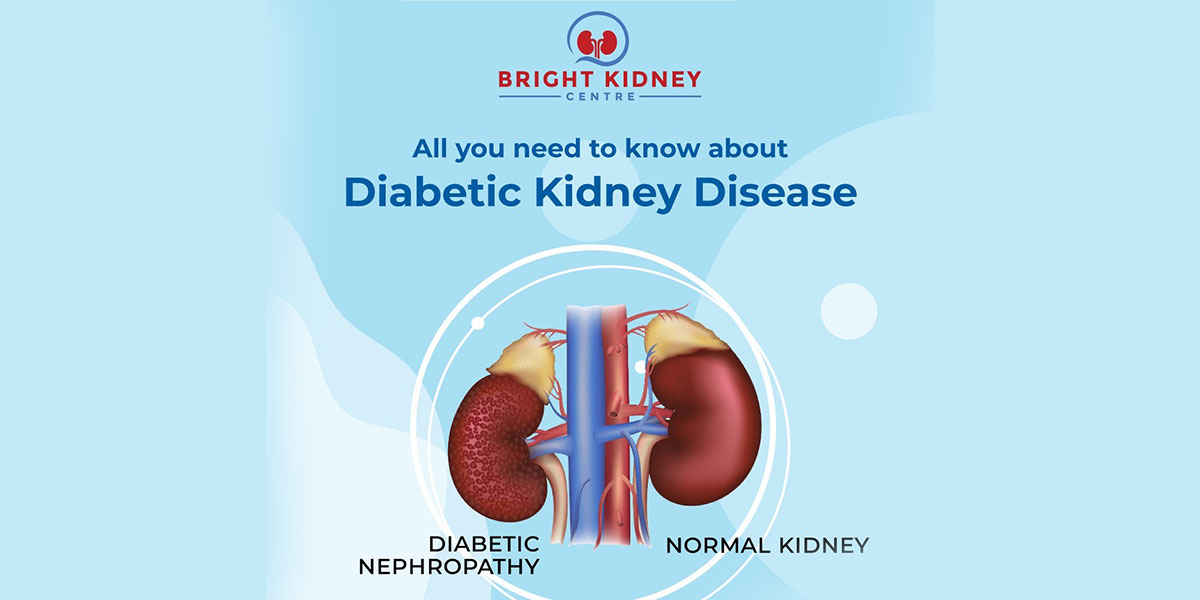All you need to know about Diabetic Kidney Disease
Diabetic Kidney Disease is the leading cause of chronic and end-stage-renal disease and is strongest predictor of mortality in patients with diabetes.
Kidney disease can occur in both Type 1 and Type 2 diabetes.
Symptoms
In the early stages of diabetic kidney disease, you may not notice any signs or symptoms. In later stages, the signs and symptoms include:
• High blood pressure
• Protein in the urine
• Swelling of feet, ankles, hands or eyes
• Increased need to urinate
• Less need for insulin or diabetes medicine
• Trouble sleep or lack of concentration
• Shortness of breath
• Loss of appetite
• Nausea and vomiting
• Itching
• Fatigue
Early diagnosis of kidney disease is essential for preserving good health. If you are pre-diabetic, type2 diabetes, or have other known diabetic risk factors, your kidneys are already overworked and their function should be tested annually.
Besides diabetes, other risk factors for kidney disease are:
- High blood pressure
- Obesity
- Heart disease
- Cigarette smoking
- A family history of kidney disease
- Taking regular pain killers
- Older age
Diagnosis
A Doctor will check for signs and ask the patient about symptoms. Diagnosis of Diabetic kidney disease can be confirmed by
- Blood tests – A blood test can show how well the kidneys are working. The blood test measures the level of creatinine, which is normally cleared from the blood by the kidneys.
- Urine tests – Urine samples provide information about your kidney function and helps to find out if there is blood or protein in urine.
- Imaging tests – Doctor will use X-rays and ultrasound to assess your kidneys structure and size. You may also undergo CT scanning and magnetic resonance imaging (MRI) to determine how well blood is circulating within the kidneys. Other imaging tests may be used in some cases.
- Kidney biopsy – A sample of kidney tissue is extracted and examined for cell damage. An analysis of kidney tissue makes it easier to make a precise diagnosis of kidney disease and guide treatment.
Treatment
The first step in treating diabetic kidney disease is to treat and control your diabetes. Lowering blood pressure and maintaining blood sugar control are absolutely necessary to slow the progression of diabetic kidney disease. There are specific medications which lower your blood pressure and protein leak in urine have been found to slow down the progression of kidney damage.
Dialysis
Dialysis is a procedure done to remove toxins and excess fluids from the blood and correct electrolyte problems when the kidneys cannot function properly. There are two types of dialysis- Hemodialysis and Peritoneal dialysis.
Hemodialysis
It is a procedure where a dialysis machine is used as an artificial kidney to remove toxins and excess fluid from blood. The patient undergoes hemodialysis about 2 to 3 times per week. Each session lasts for 4 hours.
Peritoneal dialysis
It is a type of dialysis which uses the peritoneum, which is a layer that covers the intestines in a person’s abdomen. It acts as a membrane through which fluid and dissolved substances are exchanged with the blood.
Kidney Transplant
A kidney transplant involves surgically placing a healthy kidney from a donor into your body. Transplanted kidneys can come from deceased or living donors. You’ll need to take medications for the rest of your life to keep your body from rejecting the new organ. You don’t need to be on dialysis to have a kidney transplant.
Bright Kidney Centre is one of the best kidney specialist hospitals in Hyderabad and offers the best treatment for diabetic kidney diseases. They guide you through your treatment, and help you to make the right choices that will help your progress towards healthier living.
Visit the best kidney center in Madinaguda and get the best treatment for diabetic kidney diseases.

Leave a Reply